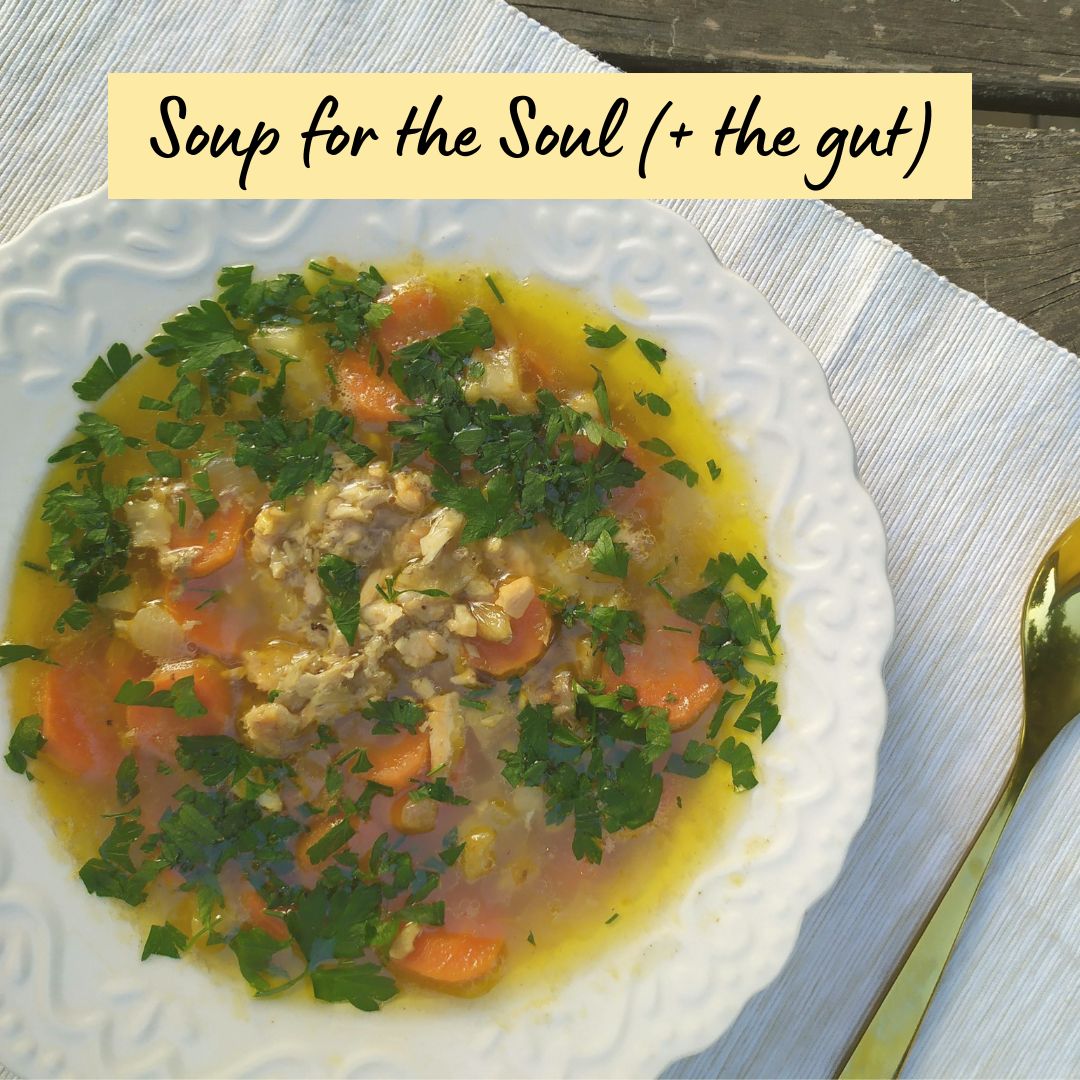Nothing sounds better than a hot cup of soup on a snowy winter day – and guess what? Your gut thinks so too!
Soup can be a valuable tool for improving your gut health this winter season. Read on to find out why.
Recap: What Makes a Meal Gut-Healthy?
Before we dive into the health benefits of soup, let’s review what makes a meal healthy for the gut in the first place.
For a healthy gut, we want a balanced microbiome, a regulated immune response (no excess inflammation), comfortable and satisfying motility, and a strong gut barrier (1, 2).
So the ideal gut health-promoting meal would:
- Support your helpful gut microbes
- Propel microbiome diversity
- Encourage motility
- Reduce excess inflammation
- Support gut barrier integrity
- Satisfy your hunger
- Taste great!
Soup can provide most of these benefits. Let’s take a look at how it accomplishes that.
Bone Broth Benefits
Let’s start by looking at the base of a soup: the broth.
How does a bunch of veggies and meat swimming in water sound? Not too appetizing. But what about veggies and meat in a salty, warm bone broth? Sign us up.
Bone broth is made by simmering animal bones and connective tissues in water. Heating the bones and tissues releases gut health-promoting nutrients trapped within the bones into the broth, giving it a rich, savory flavor (3).
Bone broth made from bone marrow contains potent vitamins, minerals, and proteins that support the microbiome, including (3):
- Omega 3
- Calcium
- Magnesium
Other nutrients found in bone broth that regulate the gut’s immune system also impact the microbiome by warding off pathogenic microbes. Nutrients found in bone broth that regulate the immune system include (3, 4, 5):
- Vitamin A
- Zinc
- Omega 3
- Arginine
- Other amino acids
Another critical component of gut health is the regulation of motility. Everyone wants to go to the bathroom enough, but not too often! Nutrients within bone broth that help with motility include (6, 7, 8):
- Selenium
- Magnesium
- Potassium
- Sodium
- Iron
These nutrients keep you hydrated and regulate hormones that affect motility, like thyroid hormones (8).
And last but not least, supporting gut barrier integrity is vital to a healthy digestive system and body. Read our blogs on leaky gut syndrome to learn more about the importance of a strong gut barrier. Nutrients within bone broth that support gut barrier integrity include (9, 10, 11):
- Zinc
- Omega 3
- Glucosamine
- Chondroitin
- Many more!
Just one bowl of bone broth can improve your diet quality significantly by providing all of the nutrients listed above. Think of these nutrients as building blocks that your body needs to create a healthy digestive system.
Picking a Bone Broth
The first step to creating a soup is to pick the broth. You have a few options here: make your own, or buy one from the store.
If you choose not to make your broth, we recommend buying bone broth rather than bouillon squares to get the most nutritional benefit from your soup.
We recommend the following brands:
- Kettle and Fire
- Brodo
- Bare Bones
- Bonafide Provisions
If you want to make your broth, you’ll need the following:
- 1 gallon of water
- 3 pounds of animal bones
- 2 tbsp apple cider vinegar
- ½ – 1 tbsp salt
- Herbs you’d like to include in your soup
Add all ingredients to a pot, bring it to a boil, and then reduce it to a simmer. Let it simmer for 16-24 hours. The longer it cooks, the stronger the flavor.
You can use animal bones from a meal you’ve made or eaten (think rotisserie chicken, wings, bones on steaks, fish bones, turkey bones) or ask the butcher at your local supermarket for their extra bones. They’ll usually give them to you for free!
Soup Recipes
Classic Chicken Noodle Soup: But Gut-Healthy
Try this gut-healthy spin on chicken noodle soup for the soul.
Ingredients:
- 4 cups chicken bone broth
- ½ tbsp minced garlic
- ¼ cup chopped onions
- 4 tbsp olive oil
- ½ tsp dried thyme
- One large chopped carrot
- One stalk of chopped celery
- Two boneless chicken thighs (antibiotic-free if possible)
- ½ cup organic rice or egg noodles
- ½ tbsp salt
- ½ tbsp pepper to taste
Directions:
- Put your bone broth, minced garlic, onions, celery, and thyme in a pot and simmer for one hour.
- While it’s simmering, coat your chicken thighs in 2 tbsp olive oil and rub with ¼ tbsp salt and ¼ tbsp pepper. Put them in the air fryer or oven until they are almost fully cooked.
- When your chicken thighs are done, take them out and put them on a wooden cutting board. Cut them into bite-sized pieces and put them into the simmering broth.
- Add your carrots and 2 tbsp of olive oil. Simmer for 15 more minutes.
- Lastly, add your noodles and simmer until the noodles are thoroughly cooked. Enjoy!
Homemade Ramen
Ingredients:
- 4 cups chicken bone broth
- 3 tbsp chopped scallions
- ½ tbsp minced garlic
- ¼ cup chopped onions
- 2 tsp fresh ginger
- 3 tbsp soy sauce
- 2 tsp sesame oil
- 2 tbsp olive oil
- Two boneless chicken thighs (antibiotic-free if possible)
- Two eggs
- ½ cup organic udon noodles
- ½ tbsp salt
- ½ tbsp pepper to taste
Directions:
- Put your bone broth, minced garlic, ginger, soy sauce, and sesame oil in a pot and simmer for one hour.
- While it’s simmering, coat your chicken thighs in 2 tbsp olive oil and rub with ¼ tbsp salt and ¼ tbsp pepper. Put them in the air fryer or oven until they are almost fully cooked.
- While the chicken is cooking, hard boil two eggs and take the shells off. Slice each of them in half. Add the rest of your salt and pepper to the eggs.
- When your chicken thighs are done, take them out and put them on a wooden cutting board. Cut them into bite-sized pieces and put them into the simmering broth.
- Add your noodles and simmer until the noodles are thoroughly cooked. Top with scallions and your eggs. Enjoy!
If you try any of these soup recipes, let us know by tagging us in a photo of it on Instagram @Igynutrition!
References
- https://www.hsph.harvard.edu/nutritionsource/microbiome/
- Assimakopoulos, Stelios F et al. “The Role of the Gut Barrier Function in Health and Disease.” Gastroenterology research vol. 11,4 (2018): 261-263. doi:10.14740/gr1053w https://www.ncbi.nlm.nih.gov/pmc/articles/PMC6089582/
- https://fdc.nal.usda.gov/fdc-app.html#/food-details/169800/nutrients
- Shakoor H, Feehan J, Al Dhaheri AS, Ali HI, Platat C, Ismail LC, Apostolopoulos V, Stojanovska L. Immune-boosting role of vitamins D, C, E, zinc, selenium and omega-3 fatty acids: Could they help against COVID-19? Maturitas. 2021 Jan;143:1-9. doi: 10.1016/j.maturitas.2020.08.003. Epub 2020 Aug 9. PMID: 33308613; PMCID: PMC7415215. https://pubmed.ncbi.nlm.nih.gov/33308613/
- Popovic PJ, Zeh HJ 3rd, Ochoa JB. Arginine and immunity. J Nutr. 2007 Jun;137(6 Suppl 2):1681S-1686S. doi: 10.1093/jn/137.6.1681S. PMID: 17513447. https://pubmed.ncbi.nlm.nih.gov/17513447/
- Harvey, R F, and A E Read. “Effects of oral magnesium sulphate on colonic motility in patients with the irritable bowel syndrome.” Gut vol. 14,12 (1973): 983-7. doi:10.1136/gut.14.12.983https://www.ncbi.nlm.nih.gov/pmc/articles/PMC1412875/
- BASS P, DANIEL EE. Influence of sodium, potassium and adrenal hormones on gastrointestinal motility. Am J Physiol. 1956 Nov;187(2):253-8. doi: 10.1152/ajplegacy.1956.187.2.253. PMID: 13372771. https://journals.physiology.org/doi/abs/10.1152/ajplegacy.1956.187.2.253?journalCode=ajplegacy
- Ebert EC. The thyroid and the gut. J Clin Gastroenterol. 2010 Jul;44(6):402-6. doi: 10.1097/MCG.0b013e3181d6bc3e. PMID: 20351569. https://pubmed.ncbi.nlm.nih.gov/20351569/
- Skrovanek, Sonja et al. “Zinc and gastrointestinal disease.” World journal of gastrointestinal pathophysiology vol. 5,4 (2014): 496-513. doi:10.4291/wjgp.v5.i4.496 https://www.ncbi.nlm.nih.gov/pmc/articles/PMC4231515/
- Durkin, Luke A et al. “Omega-3 Polyunsaturated Fatty Acids and the Intestinal Epithelium-A Review.” Foods (Basel, Switzerland) vol. 10,1 199. 19 Jan. 2021, doi:10.3390/foods10010199 https://www.ncbi.nlm.nih.gov/pmc/articles/PMC7835870/
- Shmagel, Anna et al. “The Effects of Glucosamine and Chondroitin Sulfate on Gut Microbial Composition: A Systematic Review of Evidence from Animal and Human Studies.” Nutrients vol. 11,2 294. 30 Jan. 2019, doi:10.3390/nu11020294 https://www.ncbi.nlm.nih.gov/pmc/articles/PMC6412843/





My brother suggested I might like this website. He was totally right. This post actually made my day. You cann’t imagine just how much time I had spent for this information! Thanks!
Thank you for the shout out!
Do you work with practioners wholesale? Thank you!
I just like the valuable info you supply in your articles. I will bookmark your weblog and test again right here frequently. I’m rather sure I will be told many new stuff proper right here! Best of luck for the following!
Thank you so much!